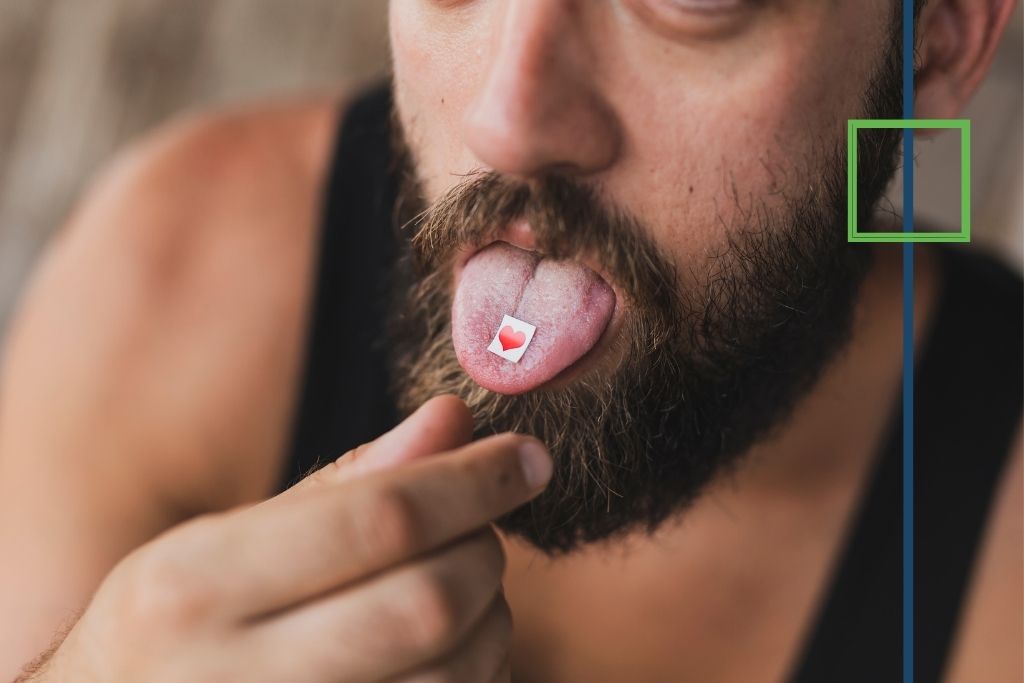Does Acid Show Up In A Drug Test?
Many people are curious about the detectability of LSD (lysergic acid diethylamide) or “acid” in drug tests. The hallucinogenic effects of LSD are among the most extreme ever documented. However, several obstacles make it difficult for drug tests to pick up LSD. This article will discuss the constraints of acid testing and the variables that can affect its detection in drug tests.
Factors Affecting Acid Drug Test Detection
- Method: LSD is not typically detected by common drug tests like urine or saliva tests. Opioids, amphetamines, cocaine, and marijuana are just some drugs they focus on. However, LSD can be detected through specialized tests, such as those utilized in forensic or research settings.
- LSD is rapidly metabolized and eliminated from the body, giving it a short half-life. Therefore, after a few hours to a few days post-use, it may no longer be detectable in typical drug tests.
- The ability of different drug tests to identify a given substance varies widely. The low prevalence of LSD means that it is not routinely included in standard drug screenings, even though it can be detected with highly sensitive laboratory techniques.
- The ability of a drug test to detect acid use depends on how long it has been since the last time you used it. Over time, the drug is flushed out of the system, making it harder to spot.
Limitations of Acid Drug Testing
- Lack of Standardized Tests: Unlike other commonly abused drugs, no standardized test detects LSD. This makes it less likely to be included in routine drug screenings.
- False Positives: Some substances or medications may yield false-positive results for LSD. This can occur due to cross-reactivity with the test’s chemical compounds, leading to potential inaccuracies in the results.
What is Acid? Understanding LSD
Acid, or lysergic acid diethylamide, is a potent hallucinogen that causes profound changes in one’s mind and how one experiences the world around them. It’s classified as a psychedelic, which alters one’s state of mind significantly. Acid was first synthesized in the 1930s, and it is derived from ergot, a fungus that grows on certain grains.
The way acid makes you feel is highly individual and diverse. Acid consumption produces heightened sensory perceptions, an altered sense of time and space, and vivid visual hallucinations. Users frequently describe seeing bright colors, feeling one with their environment, and having profound introspective and thought-provoking experiences.
The effects of acid take 20 minutes to two hours to kick in, and the high lasts anywhere from 8 hours to 12 hours. Users may experience a wide range of feelings, from euphoria to bliss to anxiety to paranoia and confusion, all within the span of the trip. The dose, the user’s tolerance, the set and setting, and the user’s mental state all play a role in determining the intensity and nature of the trip.
Remember that acid is a dangerous substance that must be handled with care. It has serious psychological effects, especially on people already vulnerable to mental health problems, and is illegal in many countries. There are risks involved with taking acid, and it can have lasting effects on one’s mental health and ability to perceive the world around them.
Seek professional help and support if you or someone you know has problems related to LSD use or effects. The difficulties of LSD use can be mitigated with the help of guidance and support from professionals in the field of substance abuse treatment and counseling.
Does Acid Show Up on a Drug Test?

Skip To:
Learn More:
Get Help. Get Better. Get Your Life Back.
Searching for Accredited Drug & Alcohol Rehab Centers Near You? Or Mental Health Support?
Even if you have failed previously, relapsed, or are in a difficult crisis, we stand ready to support you. Our trusted behavioral health specialists will not give up on you. Call us when you feel ready or want someone to speak to about therapy alternatives to change your life. Even if we cannot assist you, we will lead you wherever you can get support. There is no obligation. Call our hotline today.
FREE Addiction Hotline – Call 24/7Acid Abuse Statistics
Individuals of all ages use LSD. Data reported in the National Household Survey on Drug Abuse indicate that an estimated 20.2 million U.S. residents aged 12 and older used LSD at least once in their lifetime. The survey also revealed that many teenagers and young adults use LSD–742,000 individuals aged 12 to 17 and 4.5 million individuals aged 18 to 25 used the drug at least once.
5.5+ million people
An estimated 5.5+ million people in the U.S. used hallucinogens in the past year, in 2019
Source: NIDA
4%
LSD use between 2002 and 2019 increased overall and in all age groups, with the past 12-month rate increasing from 0.9 percent in 2002 to 4 percent in 2019
Source: NIDA
56.4%
LSD use in the US jumped 56.4% from 2015 to 2018
Source: NCBI
Acid Drug Facts
What is LSD?
LSD is a potent hallucinogen that has a high
potential for abuse and currently has no accepted
medical use in treatment in the United States.
What is its origin?
LSD is produced in clandestine laboratories in the
United States.
What are common street names?
Common street names include:
- Acid.
- Dots.
- Mellow.
- Yellow.
- Window Pane.
What does it look like?
LSD is an odorless and colorless substance with
a slightly bitter taste. LSD is available in saturated
absorbent paper (e.g., blotter paper, divided
into small, decorated squares, with each square
representing one dose), tablets or “microdots,”
saturated sugar cubes or in a liquid form.
How is it abused?
LSD is abused orally.
What is its legal status in the United States?
LSD is a Schedule I substance under the
Controlled Substances Act. Schedule I
substances have a high potential for abuse, no
currently accepted medical use in treatment in the
United States, and a lack of accepted safety for
use under medical supervision.
Popular Does Acid Show Up in a Drug Test FAQs
-
Does Acid show up in drug tests? Does acid show up on drug tests?
Cyclobenzaprine, a muscle relaxant, usually begins to work within 1 to 2 hours of the first dose. The precise onset of action, however, can differ from person to person depending on factors such as metabolism, individual response to the medication, and the severity of muscle spasms.
-
Does boric acid affect drug tests?
Boric acid is unlikely to affect drug tests as it is not typically tested for in standard drug screenings. Drug tests are designed to detect specific drugs and their metabolites, focusing on substances like opioids, amphetamines, cocaine, marijuana, and benzodiazepines.

Get Your Life Back
Find Hope & Recovery. Get Safe Comfortable Detox, Addiction Rehab & Mental Health Dual Diagnosis High-Quality Care at the We Level Up Treatment Centers Network.
Hotline (877) 378-4154
How Long Does Acid Stay in Your System?
It’s important to remember that LSD is rapidly metabolized and eliminated from the body when estimating how long acid (LSD) stays in your system. Its effects only last briefly, usually between 6 and 12 hours. Due to its low concentration and rapid elimination from the body, LSD can be difficult to detect in various drug tests.
LSD is not usually included in standard drug panels used in urine tests. To detect LSD or its metabolites, specialized testing is required. The body quickly breaks down LSD and gets rid of its metabolites. This means LSD is typically undetectable in urine after 1–4 days.
Similarly, LSD is rarely checked for in routine blood screenings. Specialized tests, however, can detect LSD in the blood within a few hours of ingestion if requested. The blood detection window is typically between 6 and 12 hours after drug use.
Hair tests can detect other substances but are ineffective in LSD due to their extended detection window. Since LSD is not metabolized in the hair follicle, this technique cannot be used to detect its presence.
Although LSD may not show up on routine drug tests, there are still legal and ethical considerations to make before trying it. LSD is banned in many nations because of its devastating effect on people’s minds and hearts. Putting one’s own health and safety first is something that should never be overlooked.
Comfortable Facilities & Amenities
High-Quality Addiction & Mental Health Rehabilitation Treatment
Rehab Centers TourRenowned Addiction Centers. Serene Private Facilities. Inpatient rehab programs vary.
Addiction Helpline (877) 378-4154Proven recovery success experience, backed by a Team w/ History of:
15+
Years of Unified Experience
100s
5-Star Reviews Across Our Centers
10K
Recovery Success Stories Across Our Network
- Low Patient to Therapist Ratio
- Onsite Medical Detox Center
- Comprehensive Dual-Diagnosis Treatment
- Complimentary Family & Alumni Programs
- Coaching, Recovery & Personal Development Events
Acid or LSD Addiction Treatment
Addiction treatment typically involves medication-assisted treatment, behavioral therapy, support groups, and residential treatment programs. The goals of addiction treatment are to help individuals stop using drugs, manage withdrawal symptoms, and develop the skills and strategies needed to maintain long-term sobriety.
Medication-assisted treatment (MAT) involves using medications to manage the physical symptoms of withdrawal and cravings that can occur when an individual stops using drugs. Medications such as buprenorphine or naltrexone can effectively reduce cravings and prevent relapse.
Behavioral therapy is another critical component of addiction treatment. This therapy focuses on changing behavior and thought patterns contributing to drug use. Cognitive-behavioral therapy (CBT) and contingency management are two evidence-based therapies effective in treating addiction.

Support groups like Narcotics Anonymous (NA) or SMART Recovery can also be important to addiction treatment. These groups provide a supportive environment where individuals can share their experiences, receive encouragement, and learn from others who have overcome addiction.
Residential treatment programs are another option for individuals struggling with addiction. These programs provide a safe, structured environment where individuals receive intensive treatment and support. Residential treatment programs may be especially beneficial for those with severe addiction, co-occurring mental health disorders, or a history of relapse.
In addition to these treatment options, addressing the physical and mental health consequences of addiction is important. Treatment may involve addressing dental decay, skin sores, anxiety, depression, and psychosis that can occur with drug use.
Overall, addiction treatment requires a comprehensive approach that addresses addiction’s physical, mental, and emotional aspects. With the appropriate support and resources, overcoming addiction and maintaining long-term sobriety is possible.
World-class, Accredited, 5-Star Reviewed, Effective Addiction & Mental Health Programs. Complete Behavioral Health Inpatient Rehab, Detox plus Co-occuring Disorders Therapy.
CALL (877) 378-4154End the Addiction Pain. End the Emotional Rollercoaster. Get Your Life Back. Start Drug, Alcohol & Dual Diagnosis Mental Health Treatment Now. Get Free No-obligation Guidance by Substance Abuse Specialists Who Understand Addiction & Mental Health Recovery & Know How to Help.
Acid or LSD Dual Diagnosis Treatment
The definition of dual diagnosis (also referred to as co-occurring disorders) can differ between institutions. However, it is generally described as the specific treatment of someone diagnosed with a substance use disorder and a mental health disorder simultaneously. Treating dual-diagnosis clients is a critical aspect of our inpatient treatment experience because co-occurring disorders are strongly correlated with instances of substance abuse.
Creating a treatment plan that addresses the physical aspects of withdrawal, the psychological connection with drug use, and managing underlying mental health disorders is part of setting clients up for success. A thorough mental health analysis identifies possibilities for treatment. Meeting with mental health counselors and medical care providers means access to behavioral therapy and medication treatment. At our dual diagnosis treatment center, We Level Up can implement the highest quality of care.
We recognize the fragile complexities of how mental and substance abuse disorders can influence others and sometimes result in a vicious cycle of addiction. That’s why we offer specialized treatment in dual-diagnosis cases to provide the most excellent chance of true healing and long-lasting recovery.
Accepting that you may be living with a mental illness can be challenging. However, treating the presenting substance abuse case can be magnitudes easier once properly diagnosed and treated. Only a properly trained medical professional can diagnose these underlying conditions. If you believe you are suffering from a disorder alongside addiction, we urge you to seek a qualified treatment center to begin your journey to recovery. Call We Level Up today.
Experience Transformative Recovery at the We Level Up Treatment Center.
See our authentic success stories. Get inspired. Get the help you deserve.



Start a New Life
Begin with a free call to an addiction & behavioral health treatment advisor. Learn more about our dual-diagnosis programs. The We Level Up treatment center network delivers various recovery programs at each treatment facility. Call to learn more.
- Personalized Care
- Caring Accountable Staff
- Comfortable Amenities
- Licensed & Accredited
- Renowned w/ 5-Star Reviews
We’ll Call You
LSD Recovery Informative Video
“I wanted my life back. I was a shell of a person. I wanted to be trusted, I wanted relationships back that I lost, mainly my children and family. It started innocent enough, I got into a car accident, and then I got kind of sucked into the whole, you know, medication issue with the pills. And before I knew it, I was in a cloud. I was sucked in by addiction, and with my mind, I kept thinking it was OK because a doctor was prescribing this for me, a doctor was giving me this, a doctor was giving me that.
So, I didn’t think I was doing anything wrong. Level Up supports my family and my relationships with my family, and they’ve helped me grow as a person. When I first started there, I was so intimidated and kind of scared, you know? But, they’ve taught me, they’ve kind of taught me how to come into my own. And then, you know, when I get the call from my twenty-one-year-old daughter in the middle of the day, just to say ‘I love you, Mom.’ that’s amazing.”
Search Does Acid Show Up in a Drug Test? Factors Affecting Acid Drug Tests Topics & Resources
Sources
[1] Drug Fact Sheet: LSD (dea.gov)
[2] Hallucinogens DrugFacts | National Institute on Drug Abuse (NIDA) (nih.gov)
[3] Lysergic Acid Diethylamide (LSD) | NIDA Archives (drugabuse.gov)
[4] Lysergic Acid Diethylamide (LSD) – StatPearls – NCBI Bookshelf (nih.gov)
[8] Protein structure reveals how LSD affects the brain | National Institutes of Health (NIH)